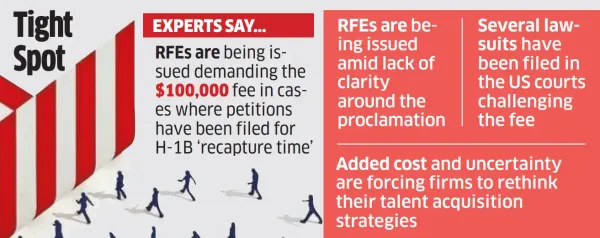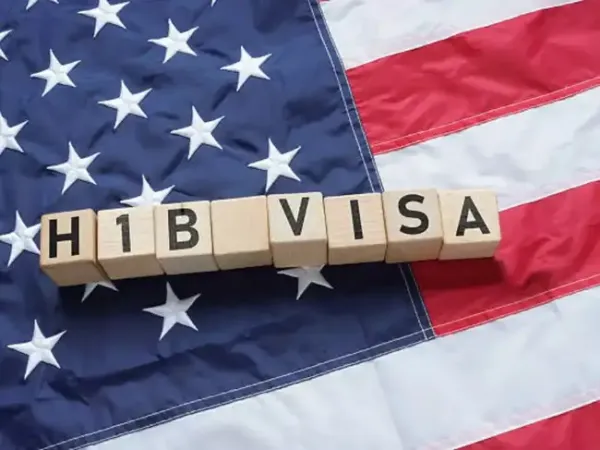The US Citizenship and Immigration Services (USCIS) has begun issuing requests for evidence (RFEs) demanding payment of the $100,000 H-1B fee amid tightening scrutiny around immigration in the region, according to people familiar with the matter.
The development follows the presidential proclamation in September imposing a $100,000 fee for fresh H-1B petitions filed by candidates outside of the US and those requiring consular processing after September 21.
The USCIS issues an RFE when an immigration officer believes there isn't enough evidence to approve the case.
Multiple immigration experts told ET that they are beginning to see RFEs, even in cases where the fee is not warranted due to lack of clarity over who is subject to the $100,000 fee, adding that this could result in more lawsuits. Indians, who account for 70% of the H-1B visas issued, are the most impacted by this development.

Gnanamookan Senthurjothi, founder of The Visa Code, said RFEs are being issued demanding the $100,000 fee in cases where petitions have been filed for H-1B “recapture time”.
H-1B recapture time allows a person to reclaim unused time in the US from the six-year limit by petitioning the USCIS to add days spent outside the US for any period longer than 24 hours.
Lack of clarity
RFEs are being issued amid lack of clarity around the proclamation despite the clarifications issued by the USCIS.
Adam Rosen, managing attorney at the Murthy Law Firm in Maryland, pointed out a key issue in the proclamation's language. “The proclamation used the term ‘visa’ interchangeably with ‘status’ despite both holding separate meanings independent of one another,” he said.
Rosen also highlighted the legal challenge to the fee itself. While section 212(f) of the Immigration and Nationality Act gives the President the authority to impose conditions on entry, the proclamation is imposing a fee on the petitioner, not the beneficiary making an entry.
Attorneys are counselling a two-step approach to those receiving an RFE. First, respond to the RFE, explaining why the fee is not required based on the USCIS's own narrower interpretation of the proclamation’s terms. Second, if the response is unsuccessful and the petition is denied for failure to pay, that denial “can be challenged in federal court”, according to Rosen, who views this as the “best recourse”.
Several lawsuits have been filed in the US courts, including those filed by the US Chamber of Commerce and a group of H-1B, challenging the fee.
Xiao Wang, CEO, Boundless Immigration, said it is likely that these filings were reviewed in the period between the initial qualification and when the USCIS offered its formal guidance on October 20. “While this has created some confusion for employers who thought they understood the rules, right now it shouldn’t be taken as an indication that the administration intends to expand the definition of who must pay the $100k filing fee,” he said.
Alternatives
While litigation is an option, it remains a difficult choice for many. Kate Kalmykov, co-chair of Florida-based Greenberg Traurig law firm's immigration and compliance practice, said, “Filing a lawsuit is generally a measure of last resort. Litigation can be both time-consuming and costly.”
Kalmykov said that the added cost and uncertainty are forcing companies to rethink their talent acquisition strategies. “At this time, some companies may choose to reassess their sponsorship strategies: either pausing new H-1B filings for overseas talent or relocating employees abroad to avoid the significant additional costs now associated with H-1B sponsorship under consular processing,” she said.
Wang said there is a fundamental shift toward self-reliance in immigration planning. “The H-1B's volatility is driving both individuals and employers to explore pathways that don’t depend on lottery systems or sudden policy changes. Companies are also investing more in upskilling domestic workers while selectively using immigration for truly critical roles,” he said.
The development follows the presidential proclamation in September imposing a $100,000 fee for fresh H-1B petitions filed by candidates outside of the US and those requiring consular processing after September 21.
The USCIS issues an RFE when an immigration officer believes there isn't enough evidence to approve the case.
Multiple immigration experts told ET that they are beginning to see RFEs, even in cases where the fee is not warranted due to lack of clarity over who is subject to the $100,000 fee, adding that this could result in more lawsuits. Indians, who account for 70% of the H-1B visas issued, are the most impacted by this development.

Gnanamookan Senthurjothi, founder of The Visa Code, said RFEs are being issued demanding the $100,000 fee in cases where petitions have been filed for H-1B “recapture time”.
H-1B recapture time allows a person to reclaim unused time in the US from the six-year limit by petitioning the USCIS to add days spent outside the US for any period longer than 24 hours.
Lack of clarity
RFEs are being issued amid lack of clarity around the proclamation despite the clarifications issued by the USCIS.
Adam Rosen, managing attorney at the Murthy Law Firm in Maryland, pointed out a key issue in the proclamation's language. “The proclamation used the term ‘visa’ interchangeably with ‘status’ despite both holding separate meanings independent of one another,” he said.
Rosen also highlighted the legal challenge to the fee itself. While section 212(f) of the Immigration and Nationality Act gives the President the authority to impose conditions on entry, the proclamation is imposing a fee on the petitioner, not the beneficiary making an entry.
Attorneys are counselling a two-step approach to those receiving an RFE. First, respond to the RFE, explaining why the fee is not required based on the USCIS's own narrower interpretation of the proclamation’s terms. Second, if the response is unsuccessful and the petition is denied for failure to pay, that denial “can be challenged in federal court”, according to Rosen, who views this as the “best recourse”.
Several lawsuits have been filed in the US courts, including those filed by the US Chamber of Commerce and a group of H-1B, challenging the fee.
Xiao Wang, CEO, Boundless Immigration, said it is likely that these filings were reviewed in the period between the initial qualification and when the USCIS offered its formal guidance on October 20. “While this has created some confusion for employers who thought they understood the rules, right now it shouldn’t be taken as an indication that the administration intends to expand the definition of who must pay the $100k filing fee,” he said.
Alternatives
While litigation is an option, it remains a difficult choice for many. Kate Kalmykov, co-chair of Florida-based Greenberg Traurig law firm's immigration and compliance practice, said, “Filing a lawsuit is generally a measure of last resort. Litigation can be both time-consuming and costly.”
Kalmykov said that the added cost and uncertainty are forcing companies to rethink their talent acquisition strategies. “At this time, some companies may choose to reassess their sponsorship strategies: either pausing new H-1B filings for overseas talent or relocating employees abroad to avoid the significant additional costs now associated with H-1B sponsorship under consular processing,” she said.
Wang said there is a fundamental shift toward self-reliance in immigration planning. “The H-1B's volatility is driving both individuals and employers to explore pathways that don’t depend on lottery systems or sudden policy changes. Companies are also investing more in upskilling domestic workers while selectively using immigration for truly critical roles,” he said.








